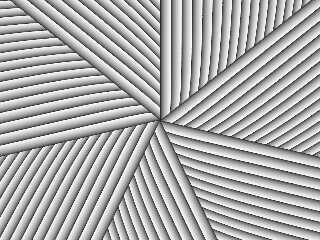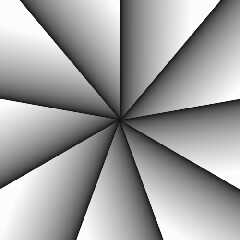 |
 |
|
 |
|
 |
|  |
|  |
|
 |
|
 |
|  |
|  |
|
 |
I was off coding some experimental patterns, and came across this one by
accident.
This looke dlike one of those things that one would probably look for, and maybe
ought be in the distribution.
#version 3.8;
global_settings {assumed_gamma 1.0}
default {finish {diffuse 1}}
//#include "functions.inc"
camera {
location <0, 0, -20>
right x*image_width/image_height
up y
look_at <0, 0, 0>
}
light_source {<0, 0, -50> rgb 1.0}
sky_sphere {pigment {rgb 1}}
#declare fmod = function (T) {select (T, 1-mod(abs(T),1), mod(abs(T),1))}
#declare AngFreq = 7;
#declare Ang = function {atan2 (x, y)/(tau/AngFreq)}
#declare Ang2 = function {fmod (Ang(x, y, z))}
#declare Rad = function {sqrt (x*x+y*y)}
#declare Mixed = function {Rad (x,y,z) * Ang2(x,y,z)}
plane {z, 0 pigment {function {Mixed(x, y, z)} } }
Post a reply to this message
Attachments:
Download 'coolradialpattern1.png' (172 KB)
Preview of image 'coolradialpattern1.png'

|
 |
|  |
|  |
|
 |
|
 |
|  |
|  |
|
 |
"Bald Eagle" <cre### [at] netscape net> wrote:
> I was off coding some experimental patterns, and came across this one by
> accident.
>
> This looke dlike one of those things that one would probably look for, and maybe
> ought be in the distribution.
>
> #version 3.8;
> global_settings {assumed_gamma 1.0}
> default {finish {diffuse 1}}
>
> //#include "functions.inc"
>
> camera {
> location <0, 0, -20>
> right x*image_width/image_height
> up y
> look_at <0, 0, 0>
>
> }
>
> light_source {<0, 0, -50> rgb 1.0}
> sky_sphere {pigment {rgb 1}}
>
> #declare fmod = function (T) {select (T, 1-mod(abs(T),1), mod(abs(T),1))}
> #declare AngFreq = 7;
> #declare Ang = function {atan2 (x, y)/(tau/AngFreq)}
> #declare Ang2 = function {fmod (Ang(x, y, z))}
> #declare Rad = function {sqrt (x*x+y*y)}
>
> #declare Mixed = function {Rad (x,y,z) * Ang2(x,y,z)}
>
> plane {z, 0 pigment {function {Mixed(x, y, z)} } }
if you can explain why it seems that way? net> wrote:
> I was off coding some experimental patterns, and came across this one by
> accident.
>
> This looke dlike one of those things that one would probably look for, and maybe
> ought be in the distribution.
>
> #version 3.8;
> global_settings {assumed_gamma 1.0}
> default {finish {diffuse 1}}
>
> //#include "functions.inc"
>
> camera {
> location <0, 0, -20>
> right x*image_width/image_height
> up y
> look_at <0, 0, 0>
>
> }
>
> light_source {<0, 0, -50> rgb 1.0}
> sky_sphere {pigment {rgb 1}}
>
> #declare fmod = function (T) {select (T, 1-mod(abs(T),1), mod(abs(T),1))}
> #declare AngFreq = 7;
> #declare Ang = function {atan2 (x, y)/(tau/AngFreq)}
> #declare Ang2 = function {fmod (Ang(x, y, z))}
> #declare Rad = function {sqrt (x*x+y*y)}
>
> #declare Mixed = function {Rad (x,y,z) * Ang2(x,y,z)}
>
> plane {z, 0 pigment {function {Mixed(x, y, z)} } }
if you can explain why it seems that way?
Post a reply to this message
|
 |
|  |
|  |
|
 |
|
 |
|  |
|  |
|
 |
"And" <49341109@ntnu.edu.tw> wrote:
> "Bald Eagle" <cre### [at] netscape net> wrote:
> > I was off coding some experimental patterns, and came across this one by
> > accident.
> >
> > This looked like one of those things that one would probably look for, and maybe
ought be in the distribution.
> if you can explain why it seems that way?
Why the pattern looks that way, or why it seems like it should be in the
distribution?
I would have to spend more time experimenting with the equations to explain why
the pattern is formed the way it is, but I felt it would be a useful pattern for
filling in grids - square grids, hexagonal grids, etc.
Likely if the pattern were modified and animated, one could perhaps get some
interesting visual effects.
It would be great to find a pre-existing library of such composite functions,
and then we could see if any more closely fit your needs for the tree-ring
pattern.
- BW net> wrote:
> > I was off coding some experimental patterns, and came across this one by
> > accident.
> >
> > This looked like one of those things that one would probably look for, and maybe
ought be in the distribution.
> if you can explain why it seems that way?
Why the pattern looks that way, or why it seems like it should be in the
distribution?
I would have to spend more time experimenting with the equations to explain why
the pattern is formed the way it is, but I felt it would be a useful pattern for
filling in grids - square grids, hexagonal grids, etc.
Likely if the pattern were modified and animated, one could perhaps get some
interesting visual effects.
It would be great to find a pre-existing library of such composite functions,
and then we could see if any more closely fit your needs for the tree-ring
pattern.
- BW
Post a reply to this message
|
 |
|  |
|  |
|
 |
|
 |
|  |
|  |
|
 |
On 9/4/23 18:18, Bald Eagle wrote:
> I was off coding some experimental patterns, and came across this one by
> accident.
>
> This looked like one of those things that one would probably look for, and maybe
> ought be in the distribution.
Neat! :-) Changing AngFreq from 7 to 9 and making use of the povr fork's
raw_wave keyword.
...
plane {z, 0
pigment {
function {Mixed(x, y, z) } raw_wave
color_map {
[0 rgb 0 ]
[AngFreq rgb 1 ]
}
}
}
...
Bill P.
Post a reply to this message
Attachments:
Download 'be.png' (73 KB)
Preview of image 'be.png'

|
 |
|  |
|  |
|
 |
|
 |
|  |
|
 |




![]()